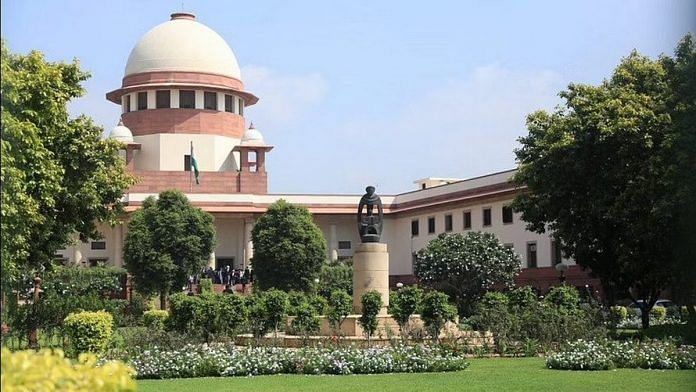New Delhi: A five-judge constitution bench led by outgoing Chief Justice of India U.U. Lalit Monday upheld the 103rd Constitution amendment, which provides for 10 per cent reservation to the economically weaker sections (EWS) in education and government jobs.
The 3:2 verdict was delivered on a batch of 40 petitions filed in 2019 raising a legal question on the validity of the amendment and whether the reservation violated the basic structure of the Constitution. The petitions included the Centre’s pleadings to transfer pending petitions challenging the EWS quota from various high courts to the top court for an authoritative pronouncement.
While Justice Dinesh Maheshwar, Justice Bela M. Trivedi and Justice J.B. Pardiwala upheld the verdict, CJI Lalit went with the minority view against the amendment, authored by Justice Ravindra Bhatt.
The bench had reserved its verdict on 27 September, after it heard lengthy arguments advanced on behalf of both sides.
This bench was one of the few Constitution benches that were set up by Justice Lalit when he took over the reins as the CJI and completed its hearing that lasted for six-and-half days.
The 103rd constitutional amendment providing for 10 per cent reservation for economically weaker sections had received the President’s approval in 2019, but has been contested ever since.
Four judgments were pronounced by the five-judge bench, with Justice Dinesh Maheshwari authoring the majority verdict. Reading out his portion of the order, Justice Maheshwari said: “It (amendment) does not violate any basic structure or damage it.”
“Reservation is an instrument of affirmative action by state so as to ensure all elusive march towards the goal of an egalitarian society, it is an instrument for inclusion of any class or section so disadvantageous,” the judge observed.
Justices Bela M. Trivedi and J.B. Pardiwala authored separate concurring views, while Justice Ravindra Bhatt wrote for himself and CJI Lalit.
Also read: How was Rs 8 lakh limit for EWS quota fixed within 2 days of 103rd amendment? SC asks Modi govt
Centre vs petitioners
The petitioners had opposed the amendment, paving the way for reservation, on the premise that economic criteria cannot be the basis of classification.
The Tamil Nadu government was one of the parties to object to the economic reservation. It submitted before the bench that in case the top court upholds such a classification, then it would have to revisit the Indra Sawhney or the Mandal judgment, which validated reservation for the socially and economically backward classes (SEBC).
On its part the Centre claimed that reservation provided under the 103rd amendment was different and had been given without disturbing the 50 per cent quota meant for SEBC. The new law granting a 10-per cent EWS quota was brought to promote social equality, by providing “equal opportunities in higher education and employment to those who have been excluded by virtue of economic status”, the government had told the court.
According to the petitioners, reservation is a tool of representation for the disadvantaged groups, but the EWS quota inverted it into a scheme for financial upliftment. Reservations were granted solely on an anti-discrimination basis and not on an “anti-depravation basis”, the petitioners had contended and argued that the amendment under challenge violated the principle of reservation underlined in the Constitution and propounded through various apex court judgments.
“EWS reservation in addition to 50 per cent of all available seats is constitutional. This is because the ceiling limit itself is flexible and only applies to caste-based reservation,” Justice Maheshwari noted in his opinion.
On his part, Justice Pardiwala opined that “reservation is not the end, but means to secure social and economic justice. It must not be allowed to become vested interest. Reservation should not continue for indefinite period of time so as to become vested interested.”
Upholding the validity of the amendment, Justice Trivedi, however, urged that at the end of 75 years of independence, it was time to revisit the system of reservation in the larger interests of the society.
(Edited by Poulomi Banerjee)
Also read: ‘A democratising force, not at odds with merit’: Why SC upheld OBC quota in medical courses



